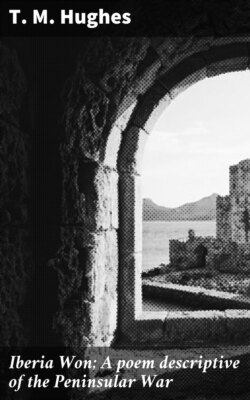Читать книгу Iberia Won; A poem descriptive of the Peninsular War - T. M. Hughes - Страница 3
На сайте Литреса книга снята с продажи.
PREFACE.
ОглавлениеTable of Contents
The following work is the result of six years’ residence in the Peninsula, devoted to literary pursuits. It contains the fruits (be they mature or otherwise) of many excursions through Spain and Portugal, of considerable opportunities of observation, and much familiarity with localities and people, as well as of meditative habits in an isolated life, which during the last three years especially has been compelled by severe sickness. Love and admiration of the British Islands, whose climate would be fatal to me, except during two or three summer months, have been fostered by constrained absence; and my attention having been strongly turned to the great Peninsular struggle, I have consulted every accessible work, and every surviving authority within my reach, that could illustrate a theme with which my mind has been filled for years. While I have endeavoured to sustain the glory of England, I have striven to award a meed of truthful but generous justice to her Allies, and have not thought it requisite to depreciate the well-earned fame of France. Yet, even while celebrating the most splendid military achievements, it has been my aim to inculcate a horror of the bloody arbitrament of War.
Determined to perfect the work, so far as in me lay, I last year traversed the whole Peninsula from East to West, at the constant risk of a very precarious life (which might thus, perhaps, become not utterly valueless), and acquired the advantages to be derived to my labours from visiting the following battle-grounds:—Bayonne and the Adour, the Nive, St. Pierre, the Nivelle, the Bidasoa, San Marcial, Vera, Sauroren, San Sebastian, Vitoria, Talavera, Almaraz, Albuera, and Badajoz, having previously visited most of the battle-fields in Portugal and in Northern and Southern Spain.
The task which I have undertaken, and accomplished according to my means, was an ambitious one, yet honourable. I scarcely dare to hope for success. I feel the full force of the immortal Scott’s address to the illustrious Wellington, in the Introduction to his Vision of Don Roderick:—
But we weak minstrels of a laggard day,
Skilled but to imitate an elder page,
Timid and raptureless, can we repay
The debt thou claim’st in this exhausted age?
Thou giv’st our lyres a theme, that might engage
Those that could send thy name o’er sea and land,
While sea and land shall last; for Homer’s rage
A theme; a theme for Milton’s mighty hand—
How much unmeet for us, a faint degenerate band!
But, while I regard with befitting humility the result of this labour of love, I trust that the spirit in which I have conceived and written has at least been pure and irreproachable.
It is with feelings of the utmost satisfaction and pride that I notice, contemporaneously with the appearance of this work, the concession of a medal to our Peninsular veterans by the high-minded Sovereign of England, whose propitious name and reign are identified with victory:—
Ἀλλὰ γὰρ ἁ μεγαλώνυμος ἦλθε Νίκα.
Soph. Antig. 148.
Victoria came with mighty name and glory.
With equal pain have I witnessed, having traversed Spain at the period, the recent success of French intrigue and the spectacle of renewed subserviency. The wedding-ring may replace the sword, but the instrument, because less bloody, is not less fatal to Liberty; and the words of Byron, at the close of the first Canto of Childe Harold, become invested with prophetic and appalling truthfulness:—
Not all the blood at Talavera shed,
Not all the marvels of Barosa’s fight,
Not Albuera lavish of the dead,
Have won for Spain her well asserted right.
When shall her Olive-Branch be free from blight?
When shall she breathe her from the blushing toil?
How many a doubtful day shall sink in night,
Ere the Frank robber turn him from his spoil,
And Freedom’s stranger-tree grow native of the soil!
Lisbon, 1st March, 1847.
